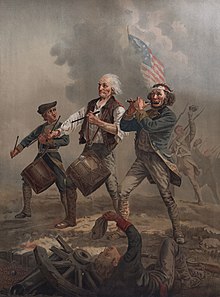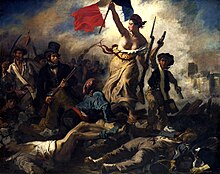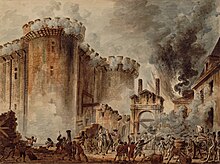Joel Barlow
Joel Barlow (24 March 1754 – 26 December 1812) was an American poet and diplomat.
Quotes
[edit]
The Conspiracy of Kings (1792)
[edit]
Their strong hands loos'd, and found their fearless tongue;
Whose voice of fire, whose deep-descending steel
Shall speak to souls, and teach dull nerves to feel.
- The Conspiracy of Kings; A Poem: Addressed to the Inhabitants of Europe, from Another Quarter of the World (1792) - online PDF edition

“Shall pass and perish, but my word remains,"
Th' eternal Word, which gave, in spite of thee,
Reason to man, that bids the man be free.

Discern with rapture where its wisdom lies;
From western heav'ns th' inverted Orient springs,
The morn of man, the dreadful night of kings.

De Launay's fate can tell your fortune there.

Heav'n's own bequest, the heritage of all.
Awake to wisdom, seize the proffer'd prize;
From shade to light, from grief to glory rise.
Freedom at last, with Reason in her train,
Extends o'er earth her everlasting reign.

The full fruition of the hopes of man.
Where sage Experience seals the sacred cause,
And that rare union, Liberty and Laws,
Speaks to the reas'ning race “to freedom rise,
Like them be equal, and like them be wise."
Think not, ye knaves, whom meanness styles the Great,
Drones of the Church and harpies of the State, —
Ye, whose curst sires, for blood and plunder fam'd,
Sultans or kings or czars or emp'rors nam'd,
Taught the deluded world their claims to own,
And raise the crested reptiles to a throne, —
Ye, who pretend to your dark host was given
The lamp of life, the mystic keys of heaven;
Whose impious arts with magic spells began
When shades of ign'rance veil'd the race of man;
Who change, from age to age, the sly deceit
As Science beams, and Virtue learns the cheat;
Tyrants of double powers, the soul that blind,
To rob, to scourge, and brutalize mankind,
Think not I come to croak with omen'd yell
The dire damnations of your future hell,
To bend a bigot or reform a knave,
By op'ning all the scenes beyond the grave.
I know your crusted souls: while one defies
In sceptic scorn the vengeance of the skies,
The other boasts, — “I ken thee, Power divine,
“But fear thee not; th' avenging bolt is mine."No! 'tis the present world that prompts the song,
The world we see, the world that feels the wrong,
The world of men, whose arguments ye know,
Of men, long curb'd to servitude and wo,
Men, rous'd from sloth, by indignation stung,
Their strong hands loos'd, and found their fearless tongue;
Whose voice of fire, whose deep-descending steel
Shall speak to souls, and teach dull nerves to feel.
- Indignant Man resumes the shaft he gave,
Disarms the tyrant, and unbinds the slave,
Displays the unclad skeleton of kings,
Spectres of power, and serpents without stings.
- But grant to kings and courts their ancient play,
Recall their splendour and revive their sway;
Can all your cant and all your cries persuade
One power to join you in your wild crusade?
In vain ye search to earth's remotest end;
No court can aid you, and no king defend.
- And didst thou hope, by thy infuriate quill
To rouse mankind the blood of realms to spill?
Then to restore, on death devoted plains,
Their scourge to tyrants, and to man his chains?
To swell their souls with thy own bigot rage,
And blot the glories of so bright an age?
First stretch thy arm, and with less impious might,
Wipe out the stars, and quench the solar light :
“For heav'n and earth," the voice of God ordains,
“Shall pass and perish, but my word remains,"
Th' eternal Word, which gave, in spite of thee,
Reason to man, that bids the man be free.
Once draw the sword; its burning point shall bring
To thy quick nerves a never-ending sting;
The blood they shed thy weight of wo shall swell,
And their grim ghosts for ever with thee dwell.Learn hence, ye tyrants, ere ye learn too late,
Of all your craft th' inevitable fate.
The hour is come, the world's unclosing eyes
Discern with rapture where its wisdom lies;
From western heav'ns th' inverted Orient springs,
The morn of man, the dreadful night of kings.
Dim, like the day-struck owl, ye grope in light,
No arm for combat, no resource in sight;
If on your guards your lingering hopes repose,
Your guards are men, and men you've made your foes;
If to your rocky ramparts ye repair,
De Launay's fate can tell your fortune there.
No turn, no shift, no courtly arts avail,
Each mask is broken, all illusions fail;
Driv'n to your last retreat of shame and fear,
One counsel waits you, one relief is near :
By worth internal, rise to self-wrought fame,
Your equal rank, your human kindred claim;
'Tis Reason's choice, 'tis Wisdom's final plan,
To drop the monarch and assume the man.
- Hail Man, exalted title! first and best,
On God's own image by his hand imprest;
To which at last the reas'ning race is driv'n,
And seeks anew what first it gain'd from Heav'n.
In every clime, thy visage greets my eyes,
In every tongue thy kindred accents rise;
The thought expanding swells my heart with glee,
It finds a friend, and loves itself in thee.Say then, fraternal family divine,
Whom mutual wants and mutual aids combine,
Say from what source the dire delusion rose,
That souls like ours were ever made for foes;
Why earth's maternal bosom, where we tread,
To rear our mansions and receive our bread,
Should blush so often for the face she bore,
So long be drench'd with floods of filial gore;
Why to small realms for ever rest confin'd
Our great affections, meant for all mankind.
Though climes divide us; shall the stream or sea,
That forms a barrier 'twixt my friend and me,
Inspire the wish his peaceful state to mar,
And meet his falchion in the ranks of war?Not seas, nor climes, nor wild ambition's fire
In nations' minds could e'er the wish inspire;
Where equal rights each sober voice should guide,
No blood would stain them, and no war divide.
'Tis dark deception, 'tis the glare of state,
Man sunk in titles, lost in Small and Great;
'Tis Rank, Distinction, all the hell that springs
From those prolific monsters, Courts and Kings.
- The gazing crowd, of glittering State afraid,
Adore the Power their coward meanness made;
In war's short intervals, while regal shows
Still blind their reason and insult their woes.
- See the long pomp in gorgeous glare display'd,
The tinsel'd guards, the squadron'd horse parade;
See heralds gay, with emblems on their vest,
In tissu'd robes, tall, beauteous pages drest;
Amid superior ranks of splendid slaves,
Lords, Dukes and Princes, titulary knaves,
Confus'dly shine their crosses, gems and stars,
Sceptres and globes and crowns and spoils of wars.
- Of these no more. From Orders, Slaves and Kings,
To thee, O Man, my heart rebounding springs.
Behold th' ascending bliss that waits your call,
Heav'n's own bequest, the heritage of all.
Awake to wisdom, seize the proffer'd prize;
From shade to light, from grief to glory rise.
Freedom at last, with Reason in her train,
Extends o'er earth her everlasting reign…
Lords of themselves and leaders of mankind.
On equal rights their base of empire lies,
On walls of wisdom see the structure rise;
Wide o'er the gazing world it towers sublime,
A modell'd form for each surrounding clime.
To useful toils they bend their noblest aim,
Make patriot views and moral views the same,
Renounce the wish of war, bid conquest cease,
Invite all men to happiness and peace,
To faith and justice rear the youthful race,
Till Truth's blest banners, o'er the regions hurl'd,
Shake tyrants from their thrones, and cheer the waking world.
- Behold, illumin'd by th' instructive age,
That great phenomenon, a Sceptred Sage.
There Stanislaus unfolds his prudent plan,
Tears the strong bandage from the eyes of man,
Points the progressive march, and shapes the way,
That leads a realm from darkness into day.
- Hail the mild morning, where the dawn began,
The full fruition of the hopes of man.
Where sage Experience seals the sacred cause,
And that rare union, Liberty and Laws,
Speaks to the reas'ning race “to freedom rise,
Like them be equal, and like them be wise."
The Hasty-Pudding (1793)
[edit]
My morning incense, and my evening meal,
The sweets of Hasty-Pudding. Come, dear bowl,
Glide o'er my palate, and inspire my soul.

Were wont to greet thee fuming from the fires.
- Despise it not, ye Bards to terror steel'd,
Who hurl'd your thunders round the epic field;
Nor ye who strain your midnight throats to sing
Joys that the vineyard and the still-house bring;
Or on some distant fair your notes employ,
And speak of raptures that you ne'er enjoy.
I sing the sweets I know, the charms I feel,
My morning incense, and my evening meal,
The sweets of Hasty-Pudding. Come, dear bowl,
Glide o'er my palate, and inspire my soul.- Canto 1: st. 1, lines 1–10

The force, the charm that to thy voice belong…
- But here tho' distant from our native shore,
With mutual glee we meet and laugh once more,
The same! I know thee by that yellow face,
That strong complexion of true Indian race,
Which time can never change, nor soil impair,
Nor Alpine snows, nor Turkey's morbid air;
For endless years, thro' every mild domain,
Where grows the maize, there thou art sure to reign.
But man, more fickle, the bold license claims,
In different realms to give thee different names.
Thee soft nations round the warm Levant
Palanta call, the French of course Polante;
E'en in thy native regions, how I blush
To hear the Pennsylvanians call thee Mush!
On Hudson's banks, while men of Belgic spawn
Insult and eat thee by the name suppawn.
All spurious appellations, void of truth:
I've better known thee from my earliest youth,
Thy name is Hasty-Pudding! thus our sires
Were wont to greet thee fuming from the fires.- Canto 1: st. 8 & st. 9, lines 1–12
- There are those who strive to stamp with disrepute
The luscious food, because it feeds the brute;
In tropes of high-strain'd wit, while gaudy prigs
Compare thy nursling man to pamper'd pigs;
With sovereign scorn I treat the vulgar jest,
Nor fear to share thy bounties with the beast.- Canto 1: st. 10, lines 1–6
Treaty of Tripoli (1797)
[edit]- As the government of the United States is not in any sense founded on the Christian Religion,—as it has in itself no character of enmity against the laws, religion or tranquility of Musselmen,—and as the said States never have entered into any war or act of hostility against any Mehomitan nation, it is declared by the parties that no pretext arising from religious opinions shall ever produce an interruption of the harmony existing between the two countries.
- Treaty of Tripoli, Article 11, signed at Tripoli on November 4, 1796, and at Algiers on January 3, 1797 and received ratification unanimously from the U.S. Senate on June 7, 1797; it was signed into law by John Adams (the original language is by Joel Barlow, U.S. Consul). This is a declaration of the secular character of the government of the United States, sometimes misattributed to John Adams, who signed the treaty into law. A portion is also sometimes misattributed to George Washington, and also misquoted as "This nation of ours was not founded on Christian principles."
The Columbiad (1807)
[edit]
Invoke no miracle, no Muse but thee.
- Almighty Freedom! give my venturous song
The force, the charm that to thy voice belong;
Tis thine to shape my course, to light my way,
To nerve my country with the patriot lay,
To teach all men where all their interest lies,
How rulers may be just and nations wise:
Strong in thy strength I bend no suppliant knee,
Invoke no miracle, no Muse but thee.- Book I
- He open'd calm the universal cause,
To give each realm its limit and its laws,
Bid the last breath of tired contention cease,
And bind all regions in the leagues of peace;
Till one confederate, condependent sway
Spread with the sun and bound the walks of day,
One centred system, one all-ruling soul
Live thro the parts and regulate the whole.- Book X
Here then, said Hesper, with a blissful smile,
Behold the fruits of thy long years of toil.
To yon bright borders of Atlantic day
Thy swelling pinions led the trackless way,
And taught mankind such useful deeds to dare,
To trace new seas and happy nations rear;
Till by fraternal hands their sails unfurl'd
Have waved at last in union o'er the world.Then let thy steadfast soul no more complain
Of dangers braved and griefs endured in vain,
Of courts insidious, envy's poison'd stings,
The loss of empire and the frown of kings;
While these broad views thy better thoughts compose
To spurn the malice of insulting foes;
And all the joys descending ages gain,
Repay thy labors and remove thy pain.- Book X

